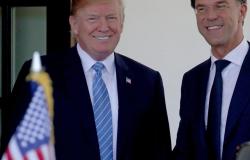The JDD. How does your political experience help you in your life as an entrepreneur?
Arnaud Montebourg. I was at the head of the first sovereignist ministry, it was divisive at the time. It was ten years ago, but people remember it. There are those who like me, those who don’t like me, but, at the same time, everyone recognizes that, everywhere in France, I am at home. Business brings people together. Politics divides them.
The company is about individual destinies coming together around a project in which everyone finds their place. This is what I do today: I set up teams, “made in France teams”.
“I am not a liberal. I am a sovereignist”
Have you converted to liberalism?
I am not a liberal. I am a sovereignist. I defend peaceful coexistence between the general interest, the interest of the nation and freedom of enterprise. We need to produce but not let everything happen. I remain in favor of state intervention. He must be kind to the small boxes and tough with the big ones. So it’s not liberal at the top and it’s liberal at the bottom.
The rest after this ad
Take the debate on the multiplication of standards, multiple prohibitions, bureaucratization: a mayor who wants to clean a ditch is obliged to ask for authorization. Everything became subject to authorization. There is only one thing to do: remove all restrictive regimes and replace them with declarative regimes. It changes everything because it means we trust people. Today there are 1,000 authorization regimes in all sectors: environment, agriculture, industry, housing, construction… It’s hell! The country is blocked.
You said the annoying word: “sovereignty”. Concretely, what are the sovereignty issues for SMEs?
The priority is the question of redirecting funding towards “the small economy”. The French savings rate is one of the highest in the world, basically we have more than 3,000 billion which are lying dormant or which are not used by banks to convert savings into investment in SMEs, nor by insurance companies which still have the windfall of tax-free life insurance. Basically, 95% of French people’s savings go into real estate. We need this money to go into the productive economy, agriculture, industry; 4% goes to listed companies, so only 1% remains for the “small” ones.
Then, we must launch a banking reform. Look at what is happening in Germany and Italy: these two countries have kept their SME fabric, have not deindustrialized. For what ? Because the banks have entered into the capital of companies, which is not the case in France. It is a local banking network close to businesses which finances their development. Banks are “under” the interests of SMEs. In France, the interests of banks take precedence over those of SMEs.
At the same time, Emmanuel Macron, for seven years, has reduced the costs of businesses, made the labor market more flexible, this has also benefited to VSEs and SMEs…
I would not make the diagnosis in these terms. I would say that the result of ten years of start-up nations is that all the start-ups have crashed or been bought by countries which have either ideas or surpluses, and behave like predators: the Chinese, the Germans or the Americans. We built the start-up nation for others.
Second, have we reversed our country’s state of economic dependence? No, we made it worse. I recall that in a famous note from François Bayrou, the High Commissioner for Planning essentially notes that our economy has the characteristics of a developing country. Apart from Île-de-France and the PACA region, all regions of France have a per capita income which has fallen below the European average.
“The impoverishment of the country is underway”
Moreover, when you travel through our regions, you pass through towns and villages where “for sale” and “for rent” signs flourish. The impoverishment of the country is underway. In ten years, we have lost 20% of the wealth created by the United States. By combining all these obstacles, we are in a situation of being a “held” country: held by others, but kept locked up.
In this context, how can we develop profitable “made in France” sectors?
I requested a study from the Demeter expert group, specialist in agricultural professions. I asked them to draw up a list of the ten star products that the French consume. Among them there are almonds, dried fruits, olive oil, kiwis, raspberries. On these ten products, we have a 6.5 billion trade deficit.
If we started producing them again in France, in a reasonable proportion, we would find an agricultural trade balance in surplus. To achieve this, 9 billion investment is required. We did it with the almond company by guaranteeing farmers a decent income.
What problems did you encounter in relaunching this sector?
Essentially technical problems that are perfectly surmountable. We gave INRA shares in our company so that their almond research unit could work with us. We have financed an entire research program on biocontrol to naturally combat the fruit pest without agrochemicals. And we now have the molecule for which we share the patent with INRA.
We then raised 15 million, we planted 250 hectares, 250 in progress, or more than 1,000 almond trees: it is the largest orchard in France which has sprung up in six years. And we sell our almonds to Carrefour, Leclerc, L’Occitane en Provence, to nougat confectioners in Montélimar.
What should the state do to help you?
Fight against foreign competition which massively imports poor quality products. I made it for the honey. I went to see the government with the whole sector. I told them : “What are you waiting for to block Chinese honey which is destroying us when we cannot even export to China? » They said : ” We will do it ! » We are still waiting.
You recently invested in nuclear power. In this sector, is there also space to undertake and improve our sovereignty?
Today there is a revival of nuclear power, not only in France, but in Europe and in the world. There are more than a hundred power plants under construction around the world. France can, if it manages to get back on track in this sector, become a world leader again. This is why I created, with my partner, Alfeor, a first-rate nuclear equipment manufacturer, capable of bringing together all competent SMEs: forging, foundry, high-precision machining, boilermaking, mechanical welding, tubing , faucets, etc.
This allows us to control the entire sector and respond to new European, national and international public orders. New acquisitions, 30 million turnover and 200 people recruited are announced, with a target of 100 million turnover next year.






